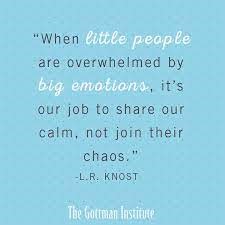Guest Blogger: Melanie Nichols

This March, we are sharing a special series of blog posts from Melanie Nichols. This series was originally posted in February 2021. You can find Melanie and her blog here. If you would like to submit to our blog, please email us.
“No!” “You can’t make me!” “I can’t do it!” “It’s never going to be ok!”
If these phrases sound familiar, you might have a young child in your life. Regulating emotions is a struggle for most young kids as they have yet to learn a constructive way to handle the big emotions they experience. Successful self-regulation can continue to elude children as they grow if they are not taught the skills needed to understand and manage their feelings. As loving parents and teachers, we are in a position to help our kids grow in their ability to self-regulate. It can be tempting to downplay their feelings – “It’s not that big of a deal” – or teach kids to hide their feelings – “Stop crying right now!” – instead of learning to manage them. Statements like these might have short-term success in stopping emotional behavior, but they don’t give children help with the skills they need to understand their feelings and practice healthy choices to show them.
An article on childmind.org (link below) encourages us with the good news that “self-regulation is a skill that can be taught like any other, and parents can play a big role in helping kids learn how to handle their emotions, even very big emotions.” The same article shares easy-to-implement strategies to help parents and teachers with this task.
1 – help children label emotions as they experience them
2 – help children pay attention to the way their body reacts to emotions
3 – model both of these skills!
As loving parents and teachers, we allow kids to have big feelings and help them develop an understanding of those emotions. Emotional regulation is a life-long skill that will help our children through the big emotions of preschool, the teenage years, and beyond.


Recent Comments